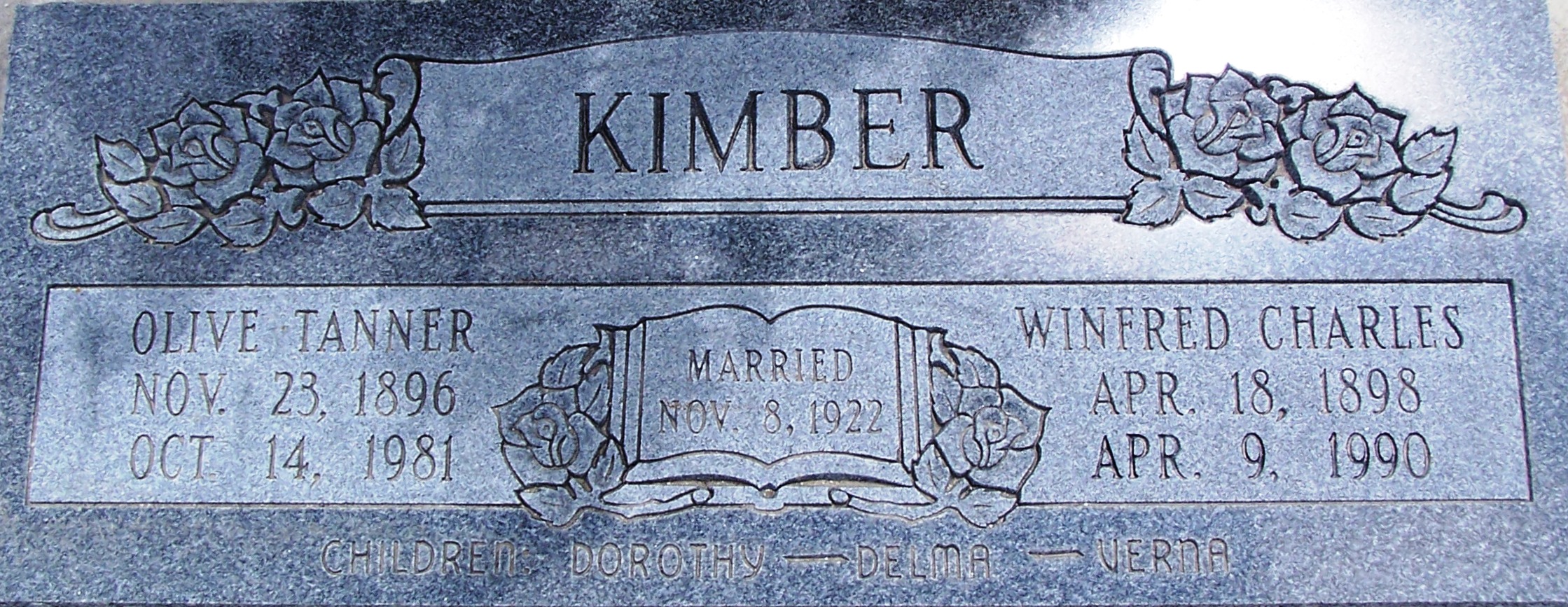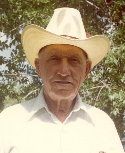 Winfred Charles Kimber was born on April 18, 1898 in a two-room log home in Grouse Creek, Utah, to Charles Kimber Jr. and Persis Josephine Laird. He had nine half brothers and sisters, Annie Elizabeth, Charles William, George Edward, Elmer, Ellen, Evan Osborne, Franklin Vaughn, Louisa Caroline, and Sarah Elizabeth, born to Charles and Sarah. Also eleven brothers and sisters, Edith Chloe, Mary Persis, Florence Hannah, Raymond Hugh, Joseph Edwin, Vera May, Rollo James, Oren LeGrande, Fern, Elsie, Charles Jr., born after his first wife Sarah passed away.
Winfred Charles Kimber was born on April 18, 1898 in a two-room log home in Grouse Creek, Utah, to Charles Kimber Jr. and Persis Josephine Laird. He had nine half brothers and sisters, Annie Elizabeth, Charles William, George Edward, Elmer, Ellen, Evan Osborne, Franklin Vaughn, Louisa Caroline, and Sarah Elizabeth, born to Charles and Sarah. Also eleven brothers and sisters, Edith Chloe, Mary Persis, Florence Hannah, Raymond Hugh, Joseph Edwin, Vera May, Rollo James, Oren LeGrande, Fern, Elsie, Charles Jr., born after his first wife Sarah passed away.
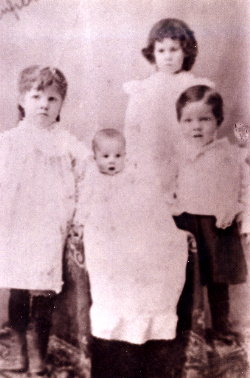
Mary, Florence, Chloe & Winfred Kimber
Winfred was about six weeks old when he suddenly became very ill and his mother was so frightened and worried that she sent for Mr. Philip Paskett to administer to him. Mr. Paskett said he would have to have a name before he could perform the ordinance. They were at a loss to know what to call him. His father was not at home and his mother did not have a name picked out. Mrs. Anne Cook, “known as Granny,” who was staying with the family at the time, got the dictionary and they picked out the name “Winfred.” The meaning of this name was “to declare peace” and as the Philippine War was at its height at this time, they thought it would be appropriate. Mr. Paskett insisted that they add Charles to the name for his father, so this was done.
Mr. Paskett blessed and administered to the baby and he became well again.
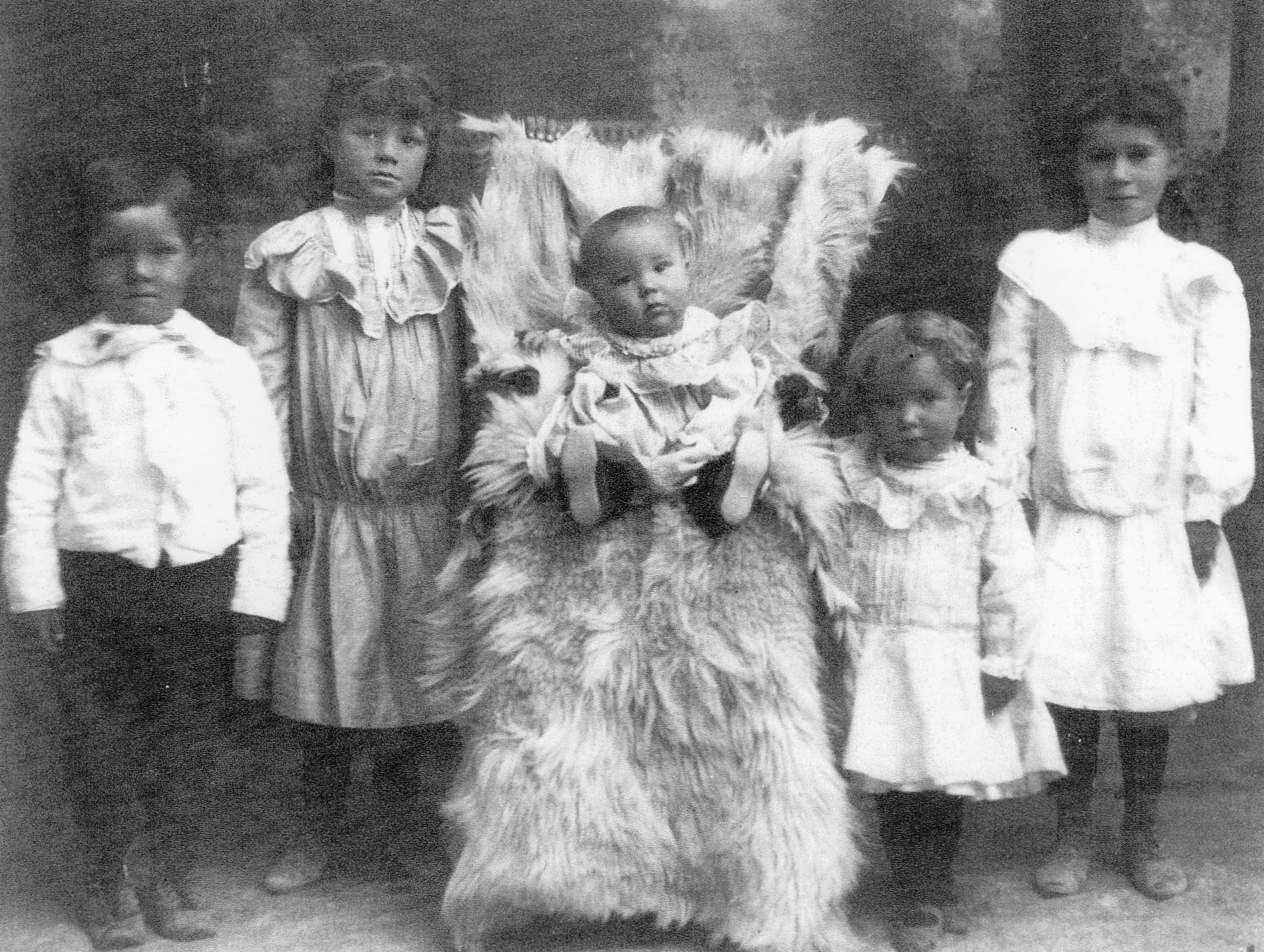
Winfred, Mary, Ray, Florence, & Chloe Kimber, ca.1903
The name did not appeal to Winfred when he was a child but as he grew older he learned to like it. The name was very uncommon and when Winfred heard it he knew he was the one being spoken to. At one time a band of Indians camped near Winfred’s home and they named a baby boy after him.
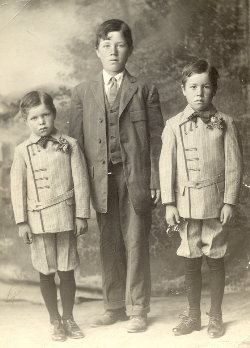
Edwin, Winfred & Raymond Kimber
They lived in the two-room house until Winfred was about five years old then another room was added and right after that they built a lean-to, which was two bedrooms and a rock cellar. It was a sandstone cellar. They lived there until the spring of 1907 and then the family moved to Pine Creek called the Morgan Place. After living there that summer then they moved back down to the old log house and stayed there until the spring of 1908. In 1908 they moved into a two-story frame home that Charles Jr. had built with seven or eight rooms in it.
When young, Winfred helped his father in the store he had started. Also his father, along with three other men, built a dance hall and skating rink and Winfred helped operate these also.
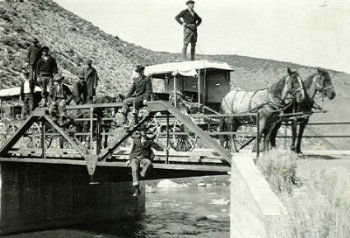
Grouse Creek Basketball – George Paskett, Herbert Tanner, Delbert Tanner, Roy (Frank) Frost, Arlin Wakefield, Afton (Jack) Wakefield, Ted Hadfield, Winfred Kimber, Delbert Warburton
The year he was fifteen, an outbreak of smallpox hit the community. There was thirteen in his family that had it. During that time, his older sister, Nell Toyn, prepared the food, not only for his family but two or three other families living in Grouse Creek. He would go up to the ranch, feed the cows, go across to her house and get a box of food for the families that were sick and deliver the food to each of them. After a few weeks the Cook boys and Clarence Richins and his boys were well enough to get around so they helped him.
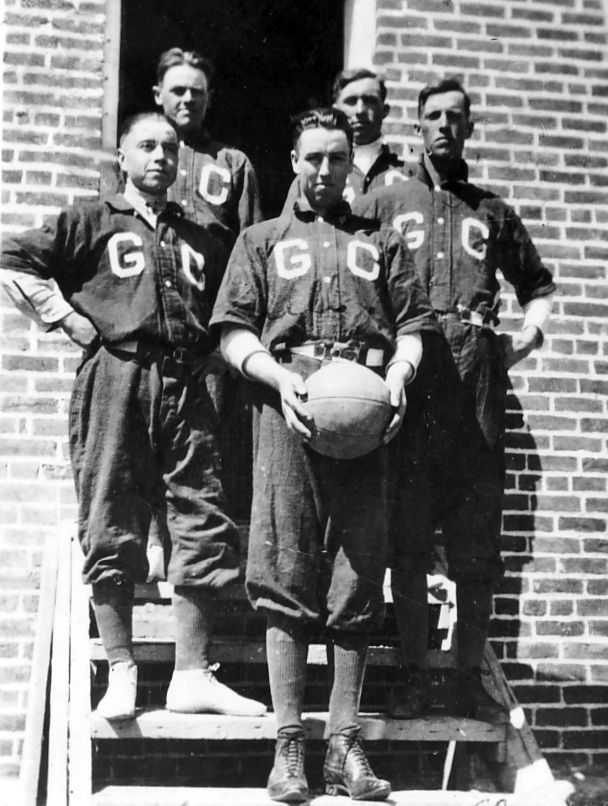
Afton Wakefield, Edwin Hadfield, Dell Warburton Winfred Kimber & George Paskett
When Winfred was about sixteen years old, he helped dig with a pick and shovel about four miles of pipeline on the north end of Grouse Creek starting at the spring in Joe Lee Creek. Charles Jr. gave them the water and fifteen shareholders went together. Everyone had to do a quarter of a mile and then a quarter of a mile was left between the bunch to do together. Uncle Elmer was away that summer so they did his quarter of a mile and then did a quarter of a mile for Aunt Lizzie and Charles Jr. had two shares so that made a mile all together. Then they helped dig the other quarter of a mile that belonged to the company. He also helped build the reservoir down at the Kimber ranch.
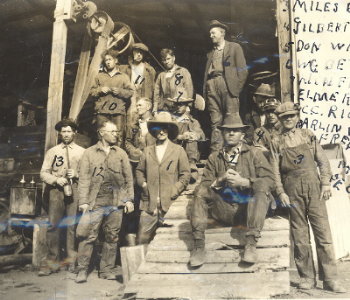
Work Crew 1-Joe Bardsley, 2-W.I. Richins, 3-Miles Bardsley, 4-Gilbert Monsen, 5-Don Wakefield, 6-W.C Betteridge, 7-Winfred Kimber, 8-Elmer Kimber, 9-C.C. Richins, 10-Arlin Wakefield, 11-Fred Jorgensen, 12-M.E. Wakefield, 13-E.O. Kimber
His first paying job was herding horses for forty cents a day. He would corral them every night and take them out in the hills and keep them together and let them pasture all day and then bring them back in at night. His father raised them and sold them to the Army during World War I.
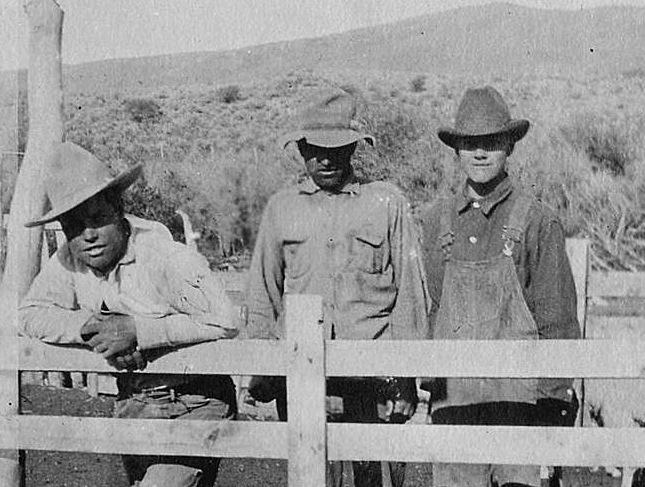
1919 – Alfred Toyn, Winfred Kimber and Neil Burton
Winfred started school when he was six years old and went until he was in the eighth grade. He quit school just before graduation time in the eighth grade to go to work on the place.
Winfred had a very happy childhood. He revered his parents and brothers and sisters. With their big family, there was always something going on. They enjoyed the holidays and celebrations. The dancing, the ball games, the foot races. He was especially good at foot racing.
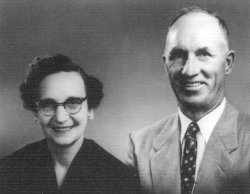
Olive & Winfred Kimber
Winfred married Olive Tanner on November 8, 1922, in the Salt Lake LDS Temple. Hugh Roberts, a brother-in-law, took them to the train in Lucin and they rode into Ogden and then took the bus to Salt Lake. While there they took a trip to the Dentist to catch up on their teeth work. They spent two or three nights in Salt Lake, one in Ogden and then came back home on the train, sending a telegram for someone to meet them.
Winfred and Olive were blessed with three girls, Dorothy, Delma and Verna. (Cute, smart, fun, good-natured.)
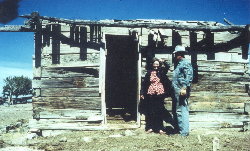
Homestead Cabin
They homesteaded forty acres up by the Morgan place. They built a cabin on it and had to cultivate five acres. This was a happy time of life for Olive and Winfred, taking care of their land, their animals and their cabin.
Later he homesteaded 640 acres farther up Pine Creek. He, along with his brother, Ray, Mom and baby Dorothy, spent one winter in Yost, feeding cows. They lived in a building with no foundation, with wind blowing through it. After Yost they moved into Amanda Tanner’s home for a little while and then they moved back up to their homestead, where they lived for about three years. Amanda became sick and was getting too old to take care of herself so they
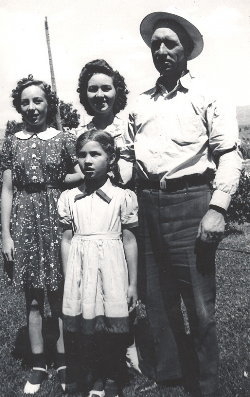
Delma, Dorothy, Verna & Winfred Kimber
moved back down to the brick house.
In 1925 he was asked to take the local road supervisor job. He stayed with that job until it materialized into a full time job and retired after about thirty years service. He worked all over Box Elder County, the main part of the work from Strevell west, including, Clear Creek, Standrod, Yost, Lynn, Park Valley, Kelton, Hogup and from Lucin south to Wendover, then Grouse Creek and Goose Creek. He was well known by everyone in the area and they appreciated his service especially after a hard winter and muddy spring when he would smooth out the roads again. He was known as the road grader/candy man. He always had a piece of candy for the kids and a smile for everyone.
Times were very hard for two or three years so he laid off his road job for two months in the spring and went shearing sheep for faster money.
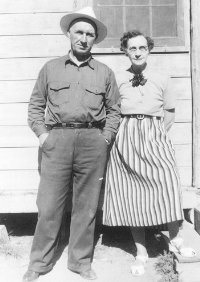
Winfred & Olive Kimber
In the meantime, he built up a little herd of cows, which his brothers (Ted and Ray) took care of, with what help he could give them. He, Ray, Ted and Elmer later purchased the Carl Peterson property in Pine Creek which took a lot of work to pay for and he was very proud of the accomplishment.
In 1942 Olive took the Post Office job and worked at that until she retired, which helped tremendously with the finances.
After Winfred’s retirement he spent full time ranching, which he enjoyed very much especially riding the range on his favorite horse “Silver.”
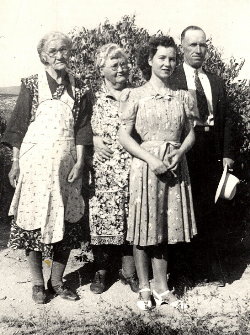
Minerva McKee Laird Roberts Horsley, Josie Laird Kimber, Dorothy Kimber, & Winfred Kimber
He also served as manager of the Co-op Store during World War II, while working on the road and his ranch. It eventually became too much to handle so he resigned from his manager job.
Winfred served as President and Counselor in the Mutual, Ward Teacher, Sunday School Superintendent, High Priest Group Leader, and counselor in the Bishopric.
He was always active in the community, serving on the Pipeline Company or store or Grouse Creek Livestock Association. He was Chairman of the Democrats in the Grouse Creek precinct. Because of this he was instrumental in talking to the governor and making it possible to borrow the money from the Farm Security to buy the Cotton Thomas property for the Grouse Creek Livestock Association. Also, he was on the committee to see about getting electricity into the Grouse Creek area. His acquaintance with United States Congressman Granger and contact with him greatly assisted obtaining this service.
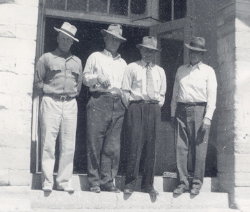
Archie Toyn, Winfred Kimber, Raymond Tanner & George (Kid) Blanthorn
Winfred grew up in an era where everyone in the community participated in the work and also the fun. There were a lot of plays, skits, dances, dinners and celebrations. The Bishop of his ward declared Saturday afternoons as holidays and everyone got together and participated in some form of entertainment.
Winfred and Olive always liked to dance and continued to enjoy doing so until their late eighties, sometimes traveling to Burley, Malta, Naf, Yost, Park Valley and any other place they could find a dance. The family enjoyed many good times together.
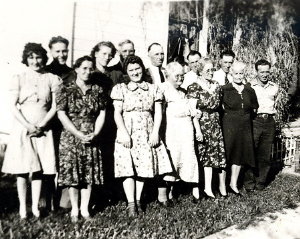
Fern, Charles, Chloe, Vera, Elmer, Elsie, Winfred, Josie, Ted, Louie, Ray, Nell, and Oren Kimber
He enjoyed being around people. Besides dancing, his greatest joy was talking and visiting. He had many friends all over the county and state. He loved people and they loved him.
He liked to kid people and was not adverse to telling things on himself.
Three examples: One day, after doctoring a very bruised leg that had been run over by the truck, he called Marge Thompson, the store manager, and told her that he had just put some horse liniment on and would be coming passed the store so she might want to close the doors and windows to keep out the smell.
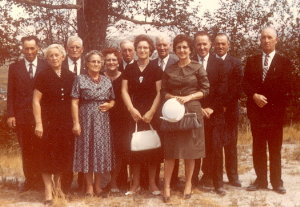
Raymond, Louisa Roberts, Elmer, Chloe Tanner, Elsie Smith, Rollo James (Jim), Vera Tanner, Osborne (OZ), Fern Shaw, Charles Junior, Edwin (Ted) and Winfred
Another time, after having been to the store, he called Naomi Kimber, who was clerking at the store, and asked if she had seen a $100.00 bill laying around up there. She said she would look for it, later after a lot of searching she called back and apologized, saying she couldn’t find it. He said “that’s okay I didn’t lose one,
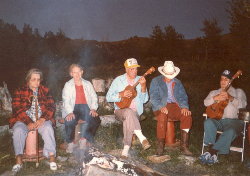
Emily Kimber, Eula Kimber, Lyman Kimber, Winfred Kimber & Archie Toyn
I was just wondering if you had seen one.”
One day while grading the road, as was his custom at noon hour, he would stop the machine, take out his lunch pail, eat what he wanted then put the rest back for a snack later, or take it home to the kids, then take a little nap, wake up and go to work for the afternoon. This particular day he went through the routine, then when he got a little hungry in the afternoon he looked in the pail and low and behold it was full, he had taken a nap but had not eaten anything. It must have been after one of his late nights out dancing.
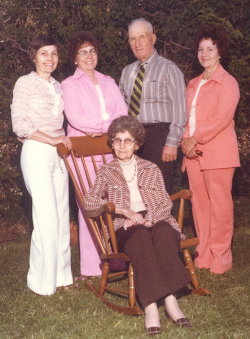
Verna Richardson, Delma Smith, Winfred Kimber, Dorothy Covieo & Olive Kimber
Winfred believed strongly in the Gospel of Jesus Christ and tried to teach all of us it’s principles.
After having trouble with a valve in his heart for a few years he died on April 9, 1990 of heart failure. He was buried in the Grouse Creek Cemetery.